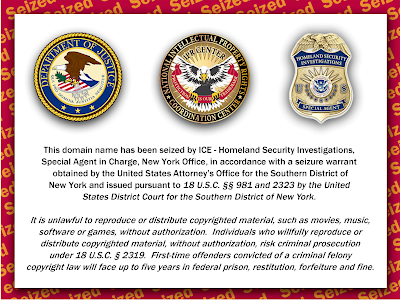The Super Bowl Goes Digital, and Yonjo Quiroa Goes to Jail
It’s Super Bowl weekend in America! This Kat applauds AmeriKat for the great enthusiasm she showed for the championship game of American football last year. This guest Kat will likely find a comfy couch at a friend’s house, where she will consume nachos, pizza and beer in quantities which she will deeply regret on Monday morning, while being amused by all the clever ads which will be occasionally interrupted by a football match between the New York Giants and the New England Patriots. Recent reports have suggested that Las Vegas bookies are sweating profusely at the thought of a Giants win - the team started the season at 80:1 odds to win it all, so some payouts could be huge. Add to that the fact that the Giants beat the Patriots earlier this season and the last time the two played in the Super Bowl 4 years ago, and there is some serious consternation in Sin City this weekend.
In a somewhat surprising and perhaps refreshing acknowledgement of the inevitable fact that consumers will, one way or another, get their entertainment online, NBC, the network which will broadcast the Super Bowl, is broadcasting it live over the internet for the first time. So one can only wonder how much nudging NBC did over at the U.S. Department of Homeland Security to set in motion the shutdown of 16 unauthorized sports event streaming websites and the arrest of the alleged operator of 9 of those sites which occurred yesterday.
Yonjo Quiroa, a/k/a “Ronaldo Solano” was arrested yesterday in New York for his alleged operation of nine websites, including www.sports95.net, www.sports95.com, www.sports95.me, www.sportswwe.tv, which allegedly operated as indexes and linking sites to other sites which hosted unauthorized copyrighted content belonging to the National Football League, National Basketball Association, National Hockey League, and World Wrestling Entertainment, and other professional sports organizations. Mr. Quiroa has been accused of violating the U.S. Copyright Act, 17 U.S.C. §506(a), which makes it a crime to commit copyright infringement “for purposes of commercial advantage or private financial gain,” and 17 U.S.C. §506(b), under which it is criminal to commit copyright infringement “by the reproduction or distribution, including by electronic means, during any 180-day period, of 1 or more copies or phonorecords of 1 or more copyrighted works, which have a total retail value of more than $1,000.”
The allegation under §506(a), that Quiroa committed infringement for purposes of commercial advantage or private financial gain, is supported by the alleged fact that Quiroa made $13,256.62 in the second half of last year from its Google Adsense account attributable to ads being posted on the various sites in question. (The complaint does not address whether any of Quiroa’s sites attempted to seek safe harbor from liability under the Digital Millennium Copyright Act, in which case financial benefit by itself would not be enough to find Quiroa guilty if he could show that he had no actual knowledge of the infringement. (The statute that says this is at 17 U.S.C. §512(d)). Of course, given the fact that the sites in question allegedly operated a search index which allowed users to access unauthorized live streams of content currently in play, showing a lack of knowledge might be a challenge.
The allegation under § 506(b), that Quiroa committed infringement by the "reproduction or distribution of . . . copies or phonorecords” allows this guest Kat the perfect opportunity to bring IPKat readers into the fray of the question that this Kat’s partner recently brought to her attention, and which has been dominating the conversation in this tiny office ever since. This Kat will now shamelessly use this chance to link you all to her partner’s blog on the subject and will acquiescence to all the necessary disclaimers that that entails, but in sum, “copies” and “phonorecords” are both defined in the Copyright Act as “material objects,” which computer files just might not be.
We will have to wait and see whether Quiroa’s counsel raises the question that Rick Sanders did - is the sharing of an MP3 file really a “distribution of a phonorecord”? Is there a “material object” involved? Of course, the answer to this question may have broader implications than how long Mr. Quiroa is likely to spend in jail (either way, one wonders whether the $13,256.62 in six months was worth the year he may face for a § 506(a) violation). If online files do not implicate the exclusive rights of distribution and reproduction, then many of the strategies currently in play by the content industries to shut down online music and movie sites may be in jeopardy.
On a separate note, this Kat is still working through the issue of what statutory authority permits the U.S. government to seize these websites prior to a conviction for infringement. She is sure that such authority must exist, and will report promptly when she finds it. If any readers of IPKat out there might be able to explain, this guest Kat would be happy for the input.


